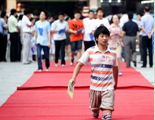题目内容
阅读理解。
Living in a foreign culture can be exciting, but it can also be confusing(令人迷惑的 ). A group of
Americans who taught English in other countries recently discussed their experiences. They decided that
miscommunications(沟通误解) were always possible, even over something as simple as " yes " and " no ".
On her first day in Micronesia, an island in the Pacific(太平洋), Lisa thought people weren't paying any attention to her. The day was hot. She went into a store and asked, " Do you have cold drinks?" The
you have cold drinks?" The
woman there didn't say anything. Lisa repeated the question. Still the woman said nothing. She later
learned that the woman had answered her: She had raised her eyebrows(眉毛),which in Micronesia means "yes".
Jan remembered an experience she had in Bulgaria, a country in Europe. She went to a restaurant that was famous for its cabbage. She asked the waiter, "Do you have cabbage today?" He nodded his head.
Jan waited, but the cabbage never came. In that country, a nod means "no".
Tom had a similar problem when arrived in India. After explaining something in class, he asked his
students if they understood. They answered with many different nods and shakes of the head. He thought
some people had not understood, so he explained again. When he asked again, they did the same thing.
He soon found out that his students did understand. In India, people nod and shake their heads in different ways depending on(依据)where they come from. You have to know where a person is from to understand whether they mean "yes" or "no".
Americans who taught English in other countries recently discussed their experiences. They decided that
miscommunications(沟通误解) were always possible, even over something as simple as " yes " and " no ".
On her first day in Micronesia, an island in the Pacific(太平洋), Lisa thought people weren't paying any attention to her. The day was hot. She went into a store and asked, " Do
 you have cold drinks?" The
you have cold drinks?" The woman there didn't say anything. Lisa repeated the question. Still the woman said nothing. She later
learned that the woman had answered her: She had raised her eyebrows(眉毛),which in Micronesia means "yes".
Jan remembered an experience she had in Bulgaria, a country in Europe. She went to a restaurant that was famous for its cabbage. She asked the waiter, "Do you have cabbage today?" He nodded his head.
Jan waited, but the cabbage never came. In that country, a nod means "no".
Tom had a similar problem when arrived in India. After explaining something in class, he asked his
students if they understood. They answered with many different nods and shakes of the head. He thought
some people had not understood, so he explained again. When he asked again, they did the same thing.
He soon found out that his students did understand. In India, people nod and shake their heads in different ways depending on(依据)where they come from. You have to know where a person is from to understand whether they mean "yes" or "no".
1. The Americans teaching English in other countries found that they .
A. should go abroad for vacations
B. needed to learn foreign languages
C. should often discuss their experiences
D. had problems with communications
B. needed to learn foreign languages
C. should often discuss their experiences
D. had problems with communications
2. People in Micronesia show "yes" by .
A. nodding heads
B. raising eyebrows
C. shaking heads
D. saying "no"
B. raising eyebrows
C. shaking heads
D. saying "no"
3. Tom misunderstood(误解) his class at first because .
A. he did not know much about Indian culture
B. he didn't explain everything clearly enough
C. some students didn't understand his questions
D. he didn't know where the students came from
B. he didn't explain everything clearly enough
C. some students didn't understand his questions
D. he didn't know where the students came from
4. Which of the following is TRUE according to this passage?
A. In Bulgaria, nodding heads means "no".
B. Jan taught English on a Pacific island.
C. Lisa was trying to buy some cabbage.
D. In India, only shaking heads means "yes".
B. Jan taught English on a Pacific island.
C. Lisa was trying to buy some cabbage.
D. In India, only shaking heads means "yes".
5. The passage is mainly about .
A. body language in foreign restaurants
B. class discussion in India schools
C. miscommunication in different cultures
D. Engl ish teaching in other countries
ish teaching in other countries
B. class discussion in India schools
C. miscommunication in different cultures
D. Engl
 ish teaching in other countries
ish teaching in other countries1-5 DBAAC

练习册系列答案
 孟建平名校考卷系列答案
孟建平名校考卷系列答案
相关题目

 young man is named "Strong Brother" by netizens (网友). He walked on his
young man is named "Strong Brother" by netizens (网友). He walked on his at is the name that netizens give to Li Wei?
at is the name that netizens give to Li Wei?